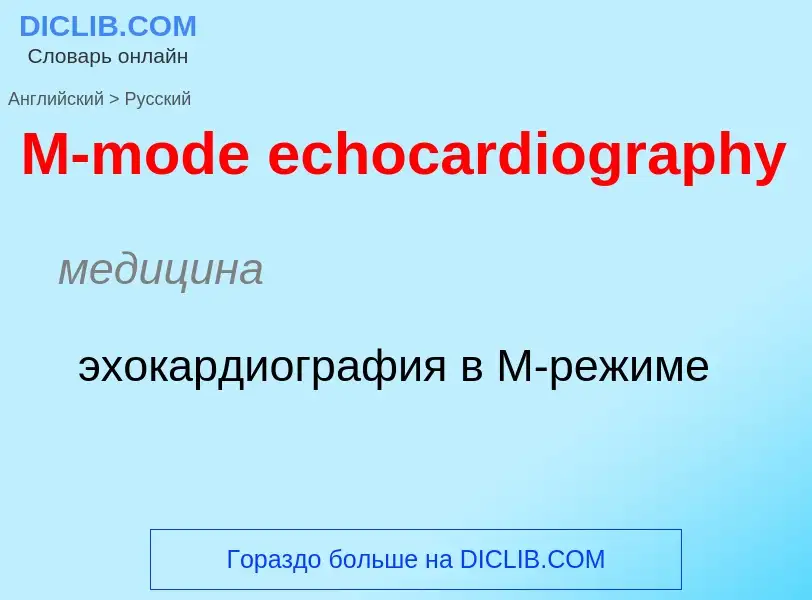Translation and analysis of words by ChatGPT artificial intelligence
On this page you can get a detailed analysis of a word or phrase, produced by the best artificial intelligence technology to date:
- how the word is used
- frequency of use
- it is used more often in oral or written speech
- word translation options
- usage examples (several phrases with translation)
- etymology
M-mode echocardiography - translation to russian
медицина
эхокардиография в М-режиме
общая лексика
автономный [режим]
режим работы периферийного устройства, при котором между ним и компьютером нет связи. Используется во время обслуживания, тестирования и конфигурирования
компьютер, не подсоединенный к локальной сети
Definition
Wikipedia
Medical ultrasound includes diagnostic techniques (mainly imaging techniques) using ultrasound, as well as therapeutic applications of ultrasound. In diagnosis, it is used to create an image of internal body structures such as tendons, muscles, joints, blood vessels, and internal organs, to measure some characteristics (e.g. distances and velocities) or to generate an informative audible sound. The usage of ultrasound to produce visual images for medicine is called medical ultrasonography or simply sonography. The practice of examining pregnant women using ultrasound is called obstetric ultrasonography, and was an early development of clinical ultrasonography.
Ultrasound is composed of sound waves with frequencies greater than 20,000 Hz, which is by approximation the upper threshold of human hearing. Ultrasonic images, also known as sonograms, are created by sending pulses of ultrasound into tissue using a probe. The ultrasound pulses echo off tissues with different reflection properties and are returned to the probe which records and displays them as an image.
A general-purpose ultrasound transducer may be used for most imaging purposes but some situations may require the use of a specialized transducer. Most ultrasound examination is done using a transducer on the surface of the body, but improved visualization is often possible if a transducer can be placed inside the body. For this purpose, special-use transducers, including transvaginal, endorectal, and transesophageal transducers are commonly employed. At the extreme, very small transducers can be mounted on small diameter catheters and placed within blood vessels to image the walls and disease of those vessels.



![Video is available]]}} Video is available]]}}](https://commons.wikimedia.org/wiki/Special:FilePath/B-flow ultrasonography of venous reflux.jpg?width=200)
![[[Ultrasound]] of [[carotid artery]] [[Ultrasound]] of [[carotid artery]]](https://commons.wikimedia.org/wiki/Special:FilePath/Carotid ultrasound.jpg?width=200)


![page=6}}<br>[https://creativecommons.org/licenses/by/4.0/ Creative Commons Attribution 4.0 International License (CC-BY 4.0)]</ref> page=6}}<br>[https://creativecommons.org/licenses/by/4.0/ Creative Commons Attribution 4.0 International License (CC-BY 4.0)]</ref>](https://commons.wikimedia.org/wiki/Special:FilePath/Hip joint injection by anterior longitudinal approach.jpg?width=200)

![Panoramic ultrasonography of a proximal [[biceps tendon rupture]]. Top image shows the contralateral normal side, and lower image shows a retracted muscle, with a [[hematoma]] filling out the proximal space. Panoramic ultrasonography of a proximal [[biceps tendon rupture]]. Top image shows the contralateral normal side, and lower image shows a retracted muscle, with a [[hematoma]] filling out the proximal space.](https://commons.wikimedia.org/wiki/Special:FilePath/Panoramic ultrasonography of biceps tendon rupture - Annotated.jpg?width=200)

![BPH]]) visualized by medical sonographic technique BPH]]) visualized by medical sonographic technique](https://commons.wikimedia.org/wiki/Special:FilePath/UltrasoundBPH.jpg?width=200)

![Ultrasound of human [[heart]] showing the four chambers and mitral and [[tricuspid]] valves. Ultrasound of human [[heart]] showing the four chambers and mitral and [[tricuspid]] valves.](https://commons.wikimedia.org/wiki/Special:FilePath/Ultrasound of human heart apical 4-cahmber view.gif?width=200)




